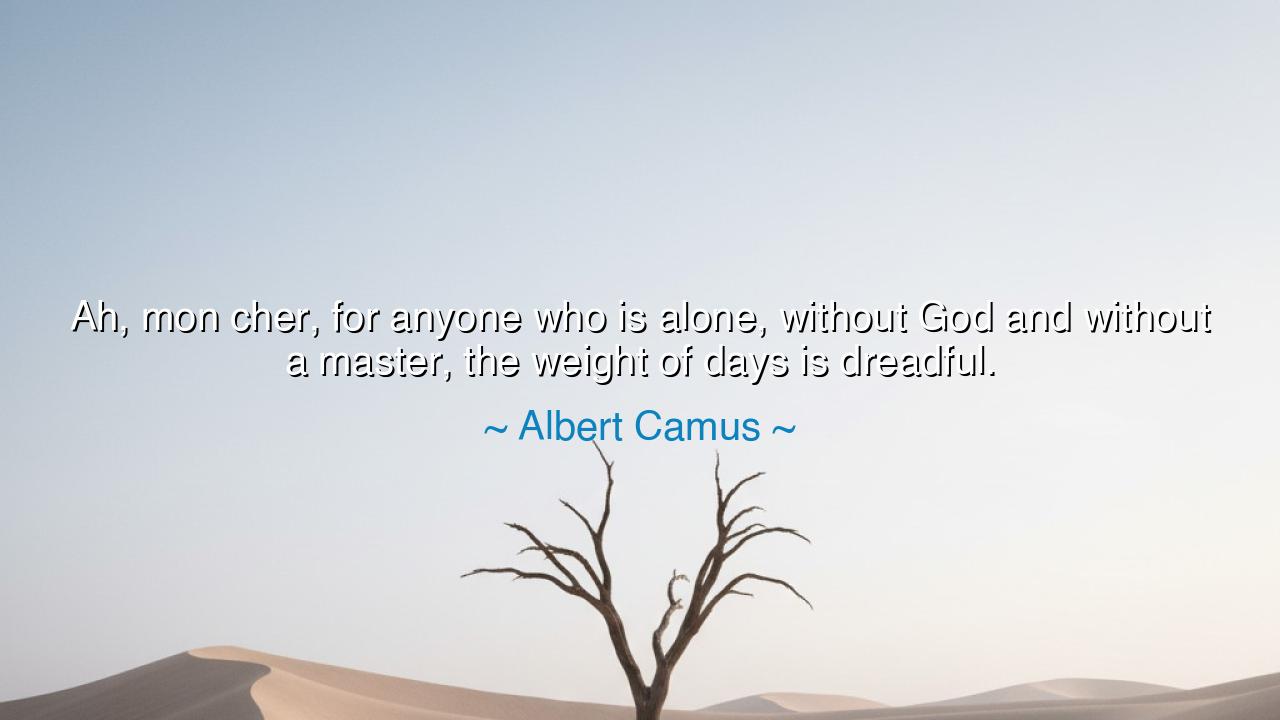
Ah, mon cher, for anyone who is alone, without God and without a
Ah, mon cher, for anyone who is alone, without God and without a master, the weight of days is dreadful.






In the haunting words of Albert Camus, the philosopher of the absurd, he wrote: “Ah, mon cher, for anyone who is alone, without God and without a master, the weight of days is dreadful.” This line, drawn from his reflections on existence, captures the aching core of the human condition — the silent burden of freedom, the loneliness of consciousness, and the despair of a soul unanchored in faith or authority. Camus, who lived through war and exile, who witnessed both the collapse of moral certainty and the rise of ideological madness, knew well what it meant to stand in the vast emptiness of a godless world. His words are not an argument, but a lament — a cry of compassion for those who bear the full weight of existence without illusion or guide.
To be without God and without a master is to live utterly free — yet utterly alone. It is the paradox of the modern soul, unchained from the altars of the past, yet trembling in the wilderness of meaning. Camus understood that when the gods die and the thrones of kings crumble, man is left face to face with the terrifying openness of his own destiny. Freedom, once idolized, becomes a burden; for now every choice, every purpose, must arise from within. Without divine order or earthly rule, the individual becomes both creator and victim of his own meaning — condemned, as Camus said elsewhere, to carry the weight of his liberty like Sisyphus carries his stone.
This weight of days — the heaviness of time itself — falls upon those who no longer believe in eternal reward or divine forgiveness. The world continues, indifferent and vast, and man must wake each morning to a sky that answers nothing. Camus himself was not a man without compassion, but one who refused to look away from truth. He saw in this emptiness both despair and possibility. For though life without God may be dreadful, it is also authentic — a life lived in full awareness, without the comfort of false hope. To live without a master is to accept the terror and beauty of responsibility, to face the abyss with open eyes.
Consider the story of Friedrich Nietzsche, another solitary spirit who, like Camus, wrestled with the death of God. Nietzsche declared that humanity must now become its own creator, that man must learn to stand without divine support. Yet the very brilliance of this freedom drove him into madness. His cry, “God is dead — and we have killed Him,” was not triumph, but tragedy. It was the recognition that in destroying the old foundations, mankind had also shattered its shelter. Both Nietzsche and Camus stood upon the ruins of faith, gazing into the silence where once the voice of God had been. And yet — they did not turn back. They sought to build meaning upon the bare earth, even if the task was endless.
The wisdom of Camus lies not in despair, but in his honesty. He did not pretend that life without belief would be easy, nor that solitude was noble by itself. He saw that when man has neither divine comfort nor mortal master, he must become both priest and king unto himself. He must learn to bear the weight of his days not through escape, but through courage — by creating beauty, by loving without reason, by choosing to live even when the universe is silent. For to live consciously in an absurd world is the highest form of defiance, the quiet heroism of the spirit.
Let this then be the teaching: do not fear the solitude of the free mind, but do not romanticize it either. If you live without God, you must fill that void not with distraction, but with purpose. If you live without a master, then master yourself. Build meaning through your actions, kindness through your choices, order through your discipline. The dreadful weight of days can become sacred if you learn to bear it with dignity — for meaning is not given; it is made.
So, dear listener, when the nights grow long and the silence heavy, remember the wisdom of Camus: to live without certainty is not to live without worth. The absence of God need not be the absence of light. Every day, though dreadful in its weight, offers you a chance to affirm your existence — not through faith imposed, but through courage freely chosen. Stand firm in that solitude. Make from your loneliness a cathedral of thought, from your struggle a hymn of endurance. For though man may be alone, his spirit — if it endures — becomes infinite.






AAdministratorAdministrator
Welcome, honored guests. Please leave a comment, we will respond soon